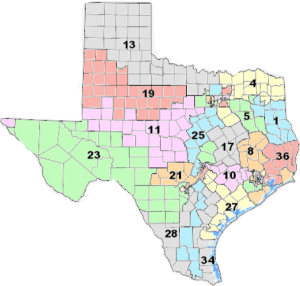Texas GOP Used Redistricting To Destroy Latino Voting Power
 Before I launch into a discussion of the recently completed redistricting trial in San Antonio let me give you a bit of information concerning the sections of the Voting Rights Act (VRA) that pertain to Latinos. Besides the language provision (Sec. 203) which will not be part of my discussion, there are two sections very important to Latinos, Sections 2 and 5. The most powerful of these is 5.
Before I launch into a discussion of the recently completed redistricting trial in San Antonio let me give you a bit of information concerning the sections of the Voting Rights Act (VRA) that pertain to Latinos. Besides the language provision (Sec. 203) which will not be part of my discussion, there are two sections very important to Latinos, Sections 2 and 5. The most powerful of these is 5.
Section 5 requires all jurisdictions covered under the law, including all of Texas, to pre-clear any and all election changes with the Department of Justice (DOJ) before implementation. All changes — polling place changes, ballot changes, redistricting changes and so forth. In order for a jurisdiction to be covered, it needs to have a history and legacy of racism, something Texas certainly has. And, if you think racism is dead in Texas, just travel and try and get service in some rural arts of the state or, in more urbane areas, try and play golf at your local country club. You may be served, but very reluctantly, and you will get stared at a lot, as if they haven’t seen Latinos “dressed to the nines” before (not that I would know from experience)!
Anyway, Section 5 is kind of like a watch dog law that keeps jurisdictions that have had a reputation of acting arbitrarily from doing so. Asi, Section 5 is like a preemptive strike. No lawsuits are involved, only questions, and the decision of the DOJ as to whether a jurisdiction has violated the law, and then requiring that the law be changed prior to implementation. And, the will revisit just to see if Section 5 is being followed in the new change.
Section 2 is really technical, requiring certain findings after a lawsuit has been brought by the discriminated community. A jurisdiction needs to have violated a part of the VRA, and this needs to be established as the result of a trial brought by the offended Latino community. The problems with section claims are that a law has to have been broken, and then a judge has to have decided that the jurisdiction has broken the law. The burden of proof here is high, and if you get a judge who does not like voting rights cases (they will say so openly), then your claim is dead in the water. In the latter case, regardless of whether you are right or wrong.
The Texas redistricting case in which I testified was a 14th Amendment case, due process, brought against the State of Texas. The citation names Governor Perry, but that is just because he signed it into law. The real culprits were the gerrymanderers, state redistricting committees, certain private political operatives and members of the United States House of Representatives.
Latino plaintiff attorneys (that’s the representatives of the Latino communities affected) were led by Nina Perales, Vice President of Litigation for MALDEF. Perales presented an almost flawless case attacking the tactics and techniques of the redistricters. I really can’t do a “color commentary” of the case because the judges are still deliberating. I will say this though, the trial revealed several things. Foremost among them, the sophisticated evolution the state has achieved over the last 40 years to discriminate against Latinos in this process, but also how poorly a bunch of amateurs do in an area requiring expertise and experience.
It revealed the hypocrisy of the Republican Party’s overtures toward Latinos. While saying that they welcome Latinos into their ranks, the Republicans did everything possible to deny Latinos the right to vote and elect candidates of their choice during the redistricting process.
Finally, and most importantly, the hypocrisy of the Republican Party’s Latino outreach was revealed in that, instead of welcoming Latinos, they really revealed the extent that racism has come to play a part in their electoral strategies and their continued attempt to use Latinos to help them gain and hold control of power in this state.

